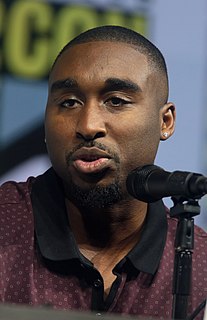A Quote by Demetrius Shipp, Jr.
I vowed to never be on camera down-talking another black man.
Related Quotes
I'm not talking about my children's father'he's a wonderful black man, the hero of my life, and he's never disrespected or betrayed me. But I'm talking about what I see in the streets and in the media, this naked hatred that black men have towards the authentic black woman'which is really an indication of black men's hatred for blackness itself.
I invented a camera that has an exposure time of one hundred years and the camera works in the simplest possible terms, because anything more complicated is more likely to break down in one way or another. It's a pinhole camera that lets in very low light and instead of exposing film, which is going to spoil within a matter of days or weeks, I'm using ordinary black paper.
You have to know the forces that are against you and that are trying to break you down. We talk about the problems facing the black community: the decimation of the black family; the mass incarceration of the black man; we're talking about the brutality against black people from the police. The educational system.
There's a lot of black men running around with crazy trauma scars, and they should be going to therapy. They should be sitting down and talking to people. But they can't. If you've got the armor of being a man, and the armor of being a black man, that hyper-masculine thing can make those scars deeper.
See?" Fezzik pointed then. Far down, at the very bottom of the mountain path, the man in black could be seen running. "Inigo is beaten." Inconceivable!" exploded the Sicilian. Fezzik never dared disagree with the hunchback. "I'm so stupid," Fezzik nodded. "Inigo has not lost to the man in black, he has defeated him. And to prove it he has put on all the man in black's clothes and masks and hoods and boots and gained eighty pounds.
I've never seen a sincere white man, not when it comes to helping black people. Usually things like this are done by white people to benefit themselves. The white man's primary interest is not to elevate the thinking of black people, or to waken black people, or white people either. The white man is interested in the black man only to the extent that the black man is of use to him. The white man's interest is to make money, to exploit.
. . . So I vowed to keep myself alive, but only if I would never use me again for just me - each one of us is born of two, and we really belong to each other. I vowed to do my own thinking, instead of trying to accommodate everyone else's opinion, credo's and theories. I vowed to apply my inventory of experiences to the solving of problems that affect everyone aboard planet Earth.
Katherine Johnson never complained, it just was what it was. She just said, "I just wanted to go to work and do my numbers." And she stopped right there. I think about that as a Black woman in Hollywood when I'm asked about diversity. I hate when people say diversity because the first thing you jump to is Black and white. When you talk about diversity, you're talking about women being hired in front of and behind the camera. You are talking about people with disabilities, the LGBTQ community...so I hate when people think about diversity.
Even a fellow with a camera has his favourite subjects, as we can see looking through the Kodak-albums of our friends. One amateur prefers the family group, another bathing scenes, another cows upon an alp, or kittens held upside down in the arms of a black-faced child. The tendency to choose one subject rather than another indicates the photographer's temperament. Nevertheless, his passion is for photography rather than for selection, a kitten will serve when no cows are available.
Remember, we're talking [in The Black Power Mixtape] about 1967, the year before [Martin Luther] King's assassination. We're talking about the emergence of black power, which is a discussion King mentioned in his last book, Where Do We Go from Here: Chaos or Community? We're talking about the meaning of black power and the possibility that it alienated our supporters, both white and black.



































